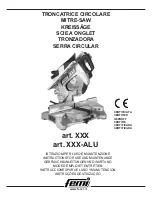
17
E N G L I S H •
User's Manual
To Help Maintain Control:
Always support the workpiece near the cut.
Always support the workpiece so the cut will be
on your right.
Always clamp the workpiece so it will not move
during the cut. Place the workpiece with the
good side down.
NOTE: The good side of the workpiece is the
side where appearance is important.
2. Before starting a cut, draw a guideline along
the desired line of cut, then place the front edge
of the saw base on that part of the workpiece
that is solidly supported.
Never place the saw on the part of the work-
piece that will fall off when the cut is made.
Always keep the cord away from the cutting
area. Always place the cord so that it does not
hang up on the workpiece when making a cut.
3. Hold the saw firmly with both hands.
WARNING: If the cord hangs up on the
workpiece during a cut, release the trigger
switch immediately. To avoid injury, unplug the
saw and move the cord to prevent it from hang-
ing up again.
DANGER: Using the saw with a damaged
cord could result in serious injury or death. If the
cord has been damaged, have it replaced before
using the saw again.
4. Depress the trigger switch to start the saw.
5. Always let the blade reach full speed before
you begin the cut into the workpiece.
6. When making a cut, always use steady, even
pressure. Forcing the saw causes rough cuts and
could shorten the life of the saw or cause Kick-
back.
7. After completing your cut, release the trig-
ger switch and allow the blade to come to a
complete stop. Do not remove the saw from the
workpiece while the blade is moving.
DANGER: When sawing through a work-
piece, the lower blade guard does not cover the
blade on the underside of the workpiece.
Always keep your hands and fingers away from
the cutting area. Any part of your body coming
in contact with the moving blade will result in
serious injury.
MAKING CROSS CUTS AND RIP CUTS
WARNING: Always securely clamp and sup-
port the workpiece. Always maintain proper
control of the saw. Failure to clamp and support
the workpiece and loss of control of the saw
could result in serious injury.
WARNING: Always maintain proper control of
the saw to make sawing safer and easier. Loss
of control of the saw could cause an accident
resulting in possibly serious injury.
1. Always use your saw with your hands posi-
tioned correctly.
2. When making cross
or rip cuts, align your
line of cut with the left
side of the notch by the
0° indicator.
3. Since the thick-
nesses of blades vary,
make a trial cut in scrap material along the
guideline to determine how much, if any, you
should offset the blade from the guideline to
allow for the kerf of the blade and make an ac-
curate cut.
MAKING RIP CUTS
Always use a guide when making long or wide
rip cuts with your saw.
You can use either a straight edge or use the
edge guide that was included with your saw.
USING A STRAIGHT EDGE
WARNING: Always securely clamp and sup-
port the workpiece. Always maintain proper
control of the saw. Failure to clamp and support
the workpiece, combined with loss of control of
the saw, could result in serious injury.
You can make an efficient rip guide by clamping
a straight edge to your workpiece.
1. Always allow the
blade to reach full
speed, and then
carefully guide the
saw into the work-
piece. Do not bind
the blade in the
cut.
2. Carefully guide the saw along the straight
edge for a straight rip cut.
3. Push the saw forward slowly enough that the
blade is not laboring.
EDGE GUIDE
The saw comes with an edge guide. It allows you
to make accurate parallel cuts.
The edge guide attaches to the saw base and is
secured in place with a turn screw.
Straight
Edge
45
0
o
o
Cutting line
0˚ Indicator
Correct posi-
tion of hands
on circular
saw.




































